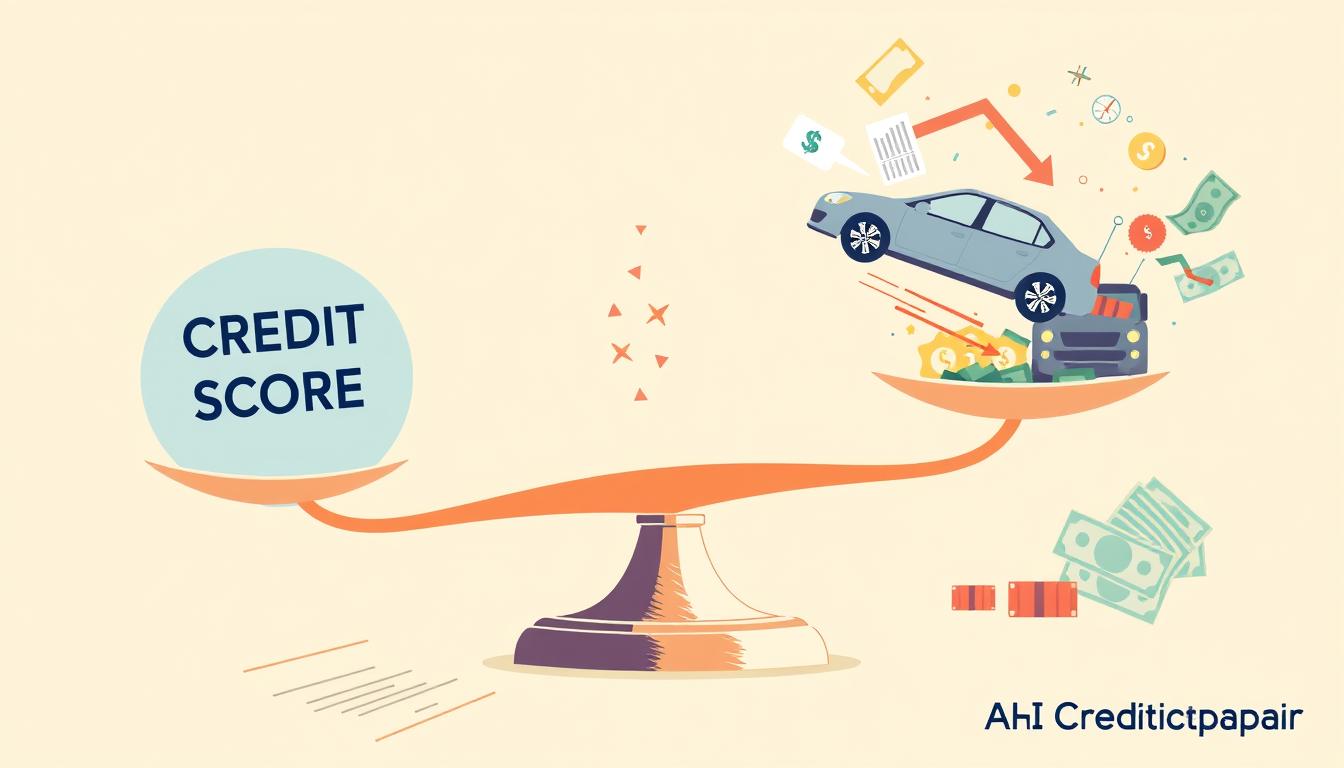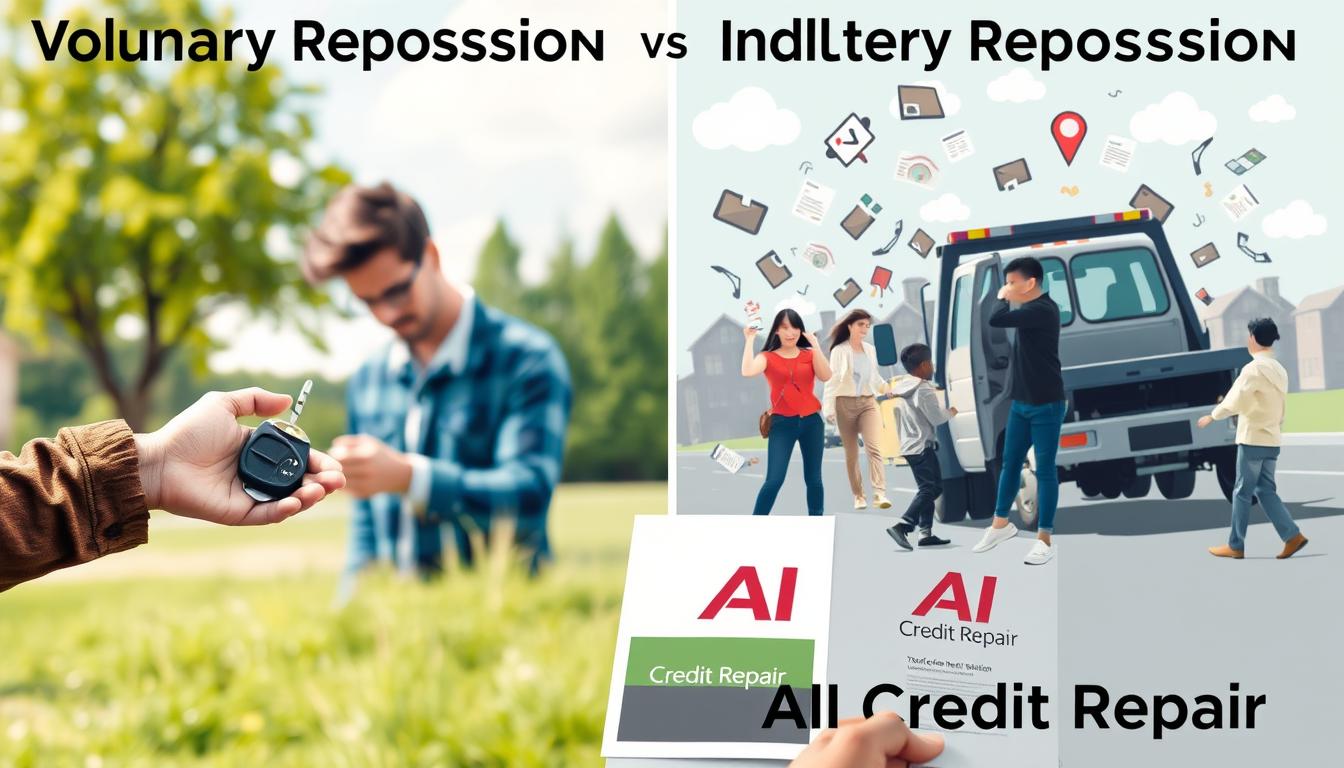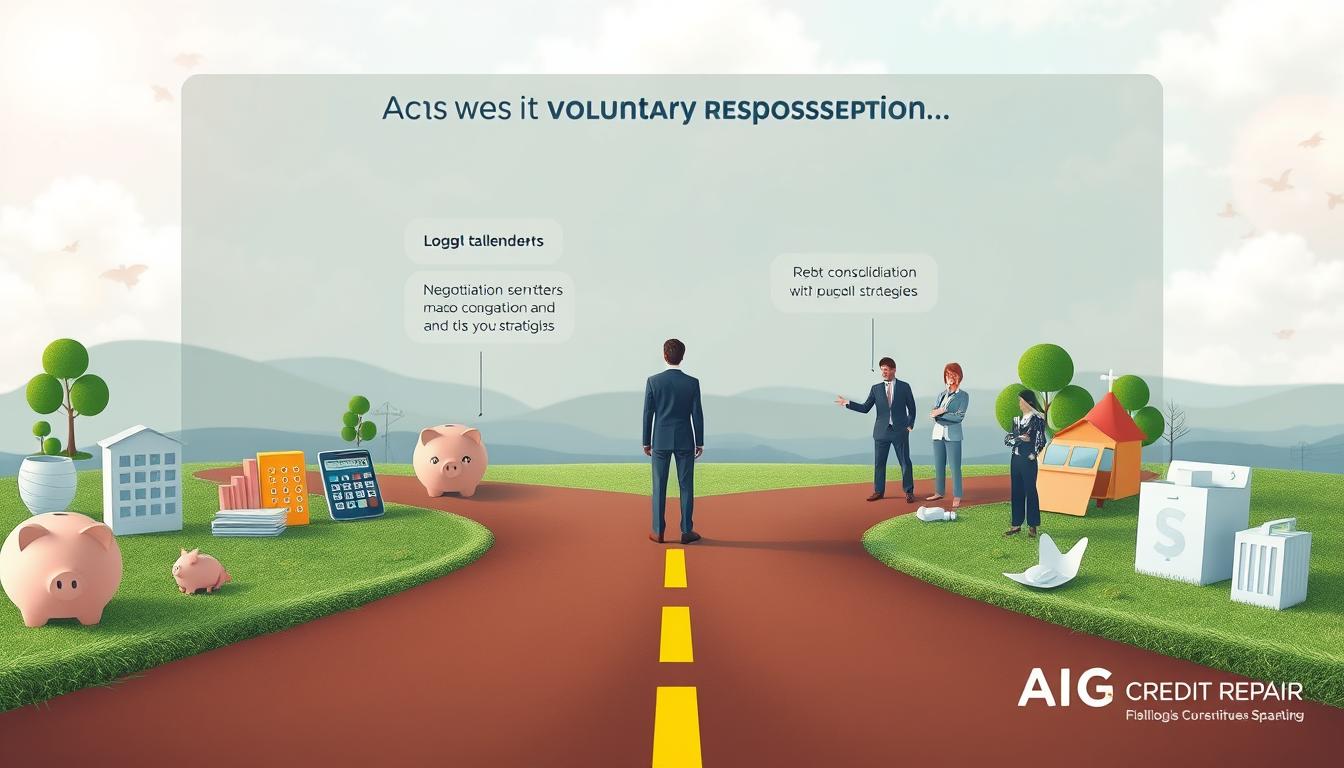A voluntary repossession can be a tough financial situation. It often leaves people worried about their credit score. This article explains how repossession affects your credit and how to lessen the damage.
We’ll look at factors that influence the credit score drop. We’ll also explore strategies to protect your financial standing. Understanding these aspects can help you make informed decisions during difficult times.
Key Takeaways
- Voluntary repossession can significantly impact your credit score, typically causing a drop of 100 to 150 points.
- The extent of the credit score drop depends on factors such as payment history, credit utilization, and the overall credit profile.
- Negotiating with the lender and taking proactive steps to rebuild your credit can help mitigate the long-term consequences of a voluntary repossession.
- Understanding the differences between voluntary and involuntary repossession is crucial in evaluating your options.
- Seeking professional advice can provide valuable guidance during the repossession process and help you navigate the path to credit recovery.
Understanding Voluntary Repossession
Voluntary repossession happens when a borrower returns a financed asset to the lender. This often involves vehicles. Borrowers choose this to avoid worse outcomes from involuntary repossession.
What Is Voluntary Repossession?
In voluntary repossession, the borrower contacts the lender to return the financed asset. This usually happens before the lender takes legal action. It gives the borrower some control over the process.
Voluntary repossession can help reduce the negative impact on a borrower’s credit score. It’s a proactive step to address financial difficulties.
Reasons for Voluntary Repossession
People may choose voluntary repossession for several reasons:
- Inability to make payments due to financial hardship or changed circumstances
- Desire to avoid extra fees and credit score damage from involuntary repossession
- Wanting to regain control over the situation and process
- Anticipation of upcoming repossession and wish to lessen credit history impact
Voluntary repossession can be a smart choice in certain financial situations. It offers more control than involuntary repossession. Understanding this option helps people make better decisions about their finances.
Impact on Credit Score
A voluntary repossession can severely hurt your credit score. It’s reported as a delinquent account to credit bureaus. This can cause a big drop in your score.
The exact impact depends on various factors. These include your credit history and the amount owed. Usually, your score can decrease by 100 points or more.
The effects can last for years. The repossession stays on your credit report for up to seven years. This makes getting future loans or credit cards tough.
| Credit Score Impact | Average Drop |
|---|---|
| Voluntary Repossession | 100-150 points |
| Involuntary Repossession | 150-200 points |
Voluntary repossession greatly affects your financial health. It’s crucial to avoid it if possible. If not, try to minimize its impact on your credit score.

“A voluntary repossession can be devastating to your credit score, making it much harder to obtain credit in the future.”
Factors Affecting Credit Score Drop
Your credit score can take a hit after a voluntary repossession. Two key factors determine the impact: payment history and credit utilization. These elements can lessen or worsen the damage to your credit profile.
Payment History
Payment history greatly influences your credit score. A strong record of on-time payments can soften the blow of a voluntary repossession. Lenders view past reliability positively, even when faced with this adverse event.
Credit Utilization
Credit utilization measures how much available credit you’re using. It’s crucial in determining the credit score drop after a voluntary repossession. Keeping utilization below 30% can help minimize damage.
High credit utilization can worsen the impact of the repossession. It’s important to manage this factor carefully.
| Factor | Impact on Credit Score Drop |
|---|---|
| Strong Payment History | Mitigates Damage |
| Low Credit Utilization | Mitigates Damage |
| Weak Payment History | Exacerbates Damage |
| High Credit Utilization | Exacerbates Damage |
Grasping how payment history and credit utilization affect your score is crucial. This knowledge helps you manage the credit impact of a voluntary repossession better.
How Much Will Your Credit Score Drop with a Voluntary Repossession?
A voluntary repossession can severely impact your credit score. It may cause a drop of 100 points or more. This decrease depends on your overall credit profile and can have long-lasting effects.
The impact varies based on several factors. These include your current score, payment history, and overall credit health. People with higher initial scores often face larger drops.
| Credit Score Range | Typical Credit Score Decrease with Voluntary Repossession |
|---|---|
| 800 – 850 | 120 – 150 points |
| 700 – 799 | 80 – 120 points |
| 600 – 699 | 50 – 80 points |
| 500 – 599 | 20 – 50 points |
This drop can hinder your ability to get favorable interest rates. It may also affect your chances of obtaining new credit or renting an apartment. These consequences can last for several years.
A voluntary repossession can lead to a credit score drop of 100 points or more, depending on your overall credit profile.
Knowing the potential impact is vital when considering voluntary repossession. This information helps you make a more informed decision. It also allows you to plan steps to lessen long-term consequences.
Minimizing Credit Score Damage
A voluntary repossession can hurt your credit score badly. But you can use strategies to lessen the damage. Talk to your lender and try to reach an agreement. This could lead to a smaller drop in your credit score.
Negotiate with Lender
Open communication with your lender is key during a voluntary repossession. Be proactive and honest about your situation. This approach can help protect your credit score.
- Explain your financial situation and the reasons for the voluntary repossession. Lenders may be more willing to work with you if they understand the circumstances.
- Request a partial payment or settlement agreement. This can potentially result in a smaller negative impact on your credit score compared to a full repossession.
- Ask the lender to report the repossession as “paid in full” or “settled” rather than a delinquency. This can help mitigate the credit score damage.
- Negotiate the removal of the repossession from your credit report after a certain period of time, if possible.
Engage with your lender and explore negotiation options. This can help reduce the credit score drop from a voluntary repossession. It’s a crucial step in protecting your financial future.
“Effective negotiation with your lender can be the key to minimizing the long-term impact of a voluntary repossession on your credit score.”
Voluntary Repossession vs. Involuntary Repossession
Voluntary repossession means returning an asset to the lender willingly. It’s usually less damaging to your credit score than involuntary repossession. Involuntary repossession occurs when the lender seizes the asset without your consent.
Both types of repossession can hurt your credit score significantly. The impact depends on your credit history, amount owed, and lender’s reporting practices.
| Metric | Voluntary Repossession | Involuntary Repossession |
|---|---|---|
| Credit Score Impact | Typically less severe | Typically more severe |
| Duration on Credit Report | Up to 7 years | Up to 7 years |
| Ability to Rebuild Credit | Slightly better chance | Slightly more challenging |
Understanding these differences can help you make better financial choices. It may also help you minimize long-term effects on your financial health. Knowing the impacts can guide your decisions in tough financial situations.

Rebuilding Credit After Repossession
Rebuilding credit should be your top priority after a voluntary repossession. Focus on consistent payments and a healthy credit mix. These steps will help restore your creditworthiness and lead to financial recovery.
Payment Habits
Developing consistent payment habits is crucial for rebuilding credit after repossession. Make all monthly payments on time, even small ones. Late or missed payments can further harm your credit score.
Be diligent and responsible with your financial obligations. This will show lenders you’re committed to improving your credit standing.
Credit Mix Strategies
Credit mix strategies can help rebuild your credit after repossession. Diversify your credit accounts with a mix of credit cards and loans. Consider getting a secured credit card too.
A diverse credit mix shows lenders you can manage different types of credit. This can positively impact your credit score over time.
Rebuilding credit takes time and patience. Focus on payment habits and credit mix to improve your profile. Regularly monitor your credit reports for accuracy and address any discrepancies.
“Rebuilding credit after a voluntary repossession requires discipline, but the effort is well worth it in the long run.”
Alternatives to Voluntary Repossession
Facing voluntary repossession? Don’t worry, you have options. These alternatives can help you avoid a big hit to your credit score. Let’s explore ways to keep your financial stability intact.
Talk to your lender. Many are willing to work with you. They might offer a new payment plan or temporary deferment. Open communication shows you’re serious about fixing the issue.
Look for financial help. Government programs, non-profits, and community resources might assist you. They can offer counseling, debt management tips, or even direct financial support. These tools can help you avoid repossession.
Consider refinancing your vehicle loan. This could lead to better terms. You might get a lower interest rate or more time to repay. These changes can make your monthly payments easier to handle.
| Alternative | Description | Potential Benefits |
|---|---|---|
| Negotiate with Lender | Communicate with your lender to find a mutually acceptable solution, such as a modified payment plan or temporary deferment. | Avoid the negative impact of a voluntary repossession on your credit score. |
| Seek Financial Assistance | Explore government programs, non-profit organizations, or community resources that can provide counseling, debt management strategies, or direct financial support. | Obtain the necessary resources to help you get back on track with your payments and prevent repossession. |
| Refinance Vehicle Loan | Secure more favorable loan terms, such as a lower interest rate or extended repayment period, to make your monthly payments more manageable. | Avoid the credit score drop associated with a voluntary repossession. |
These alternatives to voluntary repossession can help protect your credit score. They offer ways to prevent repossession and keep your finances healthy. With the right approach, you can overcome this challenge and come out stronger.

When to Consider Voluntary Repossession
Voluntary repossession should be a last resort. It may be suitable if you can’t afford payments and have no other options. This could happen when your financial situation changes drastically.
Here are some key situations where voluntary repossession may be the best option:
- Unaffordable Payments – Your finances have changed, making monthly car payments impossible. Voluntary repossession might be better than involuntary action by the lender.
- Avoiding Damage to Credit – Voluntary repossession usually hurts your credit score less than involuntary repossession. This can help you rebuild credit faster.
- Minimizing Fees and Penalties – You might negotiate with the lender to reduce fees with voluntary repossession. This could save you money compared to involuntary repossession.
Consider the pros and cons of voluntary repossession carefully. Explore all other options first. Talk to a financial advisor or credit counselor for guidance.
They can help you decide if this is right for your situation. Remember, this decision can impact your financial future significantly.
“Voluntary repossession can be a difficult decision, but in some cases, it may be the most responsible path forward.”
Seeking Professional Advice
Facing voluntary repossession? Seek expert advice. Financial pros and lawyers can guide you. They’ll help you understand the impact on your credit and overall finances.
A financial advisor offers valuable insights on credit score effects. They can explore alternatives and help rebuild your credit. Your advisor will assess your situation and develop a tailored plan.
Legal counsel ensures you know your rights during voluntary repossession. They can negotiate with lenders and protect your interests. Their guidance is crucial throughout the process.
Professional advice for seeking professional advice for voluntary repossession leads to informed decisions. It helps align choices with your financial goals. This approach minimizes long-term effects on your credit and finances.
| Professional Advice | Benefit |
|---|---|
| Financial Advisor Recommendations | Understand the impact on your credit score and explore strategies to minimize the damage |
| Legal Counsel for Repossession | Navigate the legal aspects of the voluntary repossession process and ensure your rights are protected |

“Seeking professional advice is crucial when facing a voluntary repossession. The guidance of a financial advisor and legal counsel can help you make the best decision for your financial future.”
Conclusion
Voluntary repossession can significantly lower your credit score. Understanding its impact on payment history and credit utilization helps you make informed decisions. Exploring alternatives can minimize damage to your financial standing.
While it may seem like a quick fix, the long-term effects can be severe. Work with your lender to find other solutions. Rebuild your credit through responsible financial habits to improve your future prospects.
Making an informed decision is crucial when considering voluntary repossession. Take proactive steps to protect your credit score. Seek professional advice to navigate this process confidently and safeguard your financial well-being.

